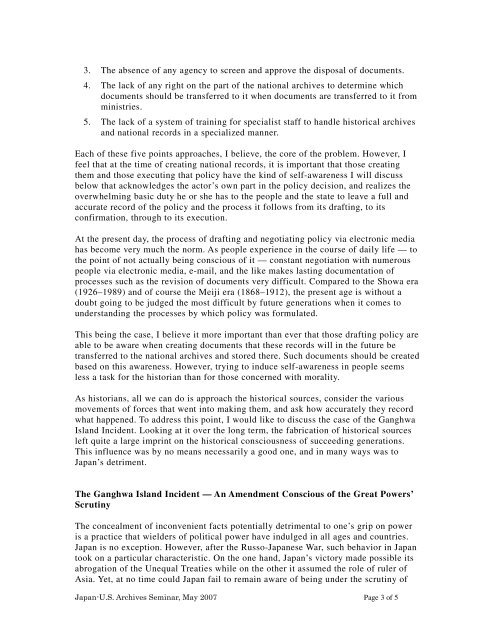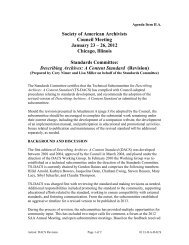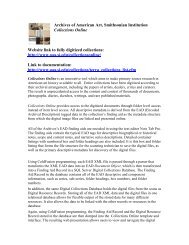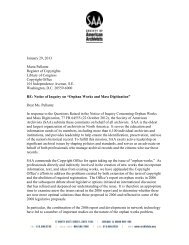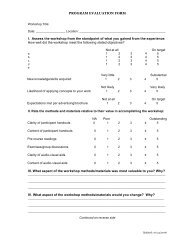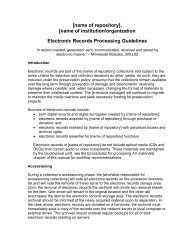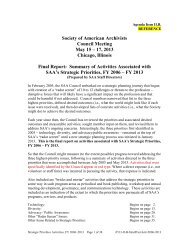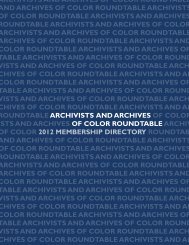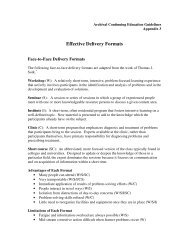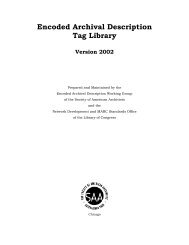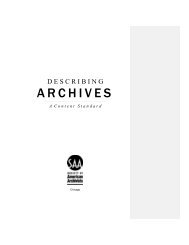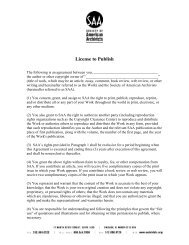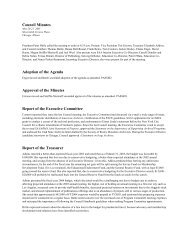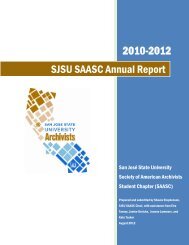The Use and Misuse of History in Modern Japanese History
The Use and Misuse of History in Modern Japanese History
The Use and Misuse of History in Modern Japanese History
Create successful ePaper yourself
Turn your PDF publications into a flip-book with our unique Google optimized e-Paper software.
3. <strong>The</strong> absence <strong>of</strong> any agency to screen <strong>and</strong> approve the disposal <strong>of</strong> documents.<br />
4. <strong>The</strong> lack <strong>of</strong> any right on the part <strong>of</strong> the national archives to determ<strong>in</strong>e which<br />
documents should be transferred to it when documents are transferred to it from<br />
m<strong>in</strong>istries.<br />
5. <strong>The</strong> lack <strong>of</strong> a system <strong>of</strong> tra<strong>in</strong><strong>in</strong>g for specialist staff to h<strong>and</strong>le historical archives<br />
<strong>and</strong> national records <strong>in</strong> a specialized manner.<br />
Each <strong>of</strong> these five po<strong>in</strong>ts approaches, I believe, the core <strong>of</strong> the problem. However, I<br />
feel that at the time <strong>of</strong> creat<strong>in</strong>g national records, it is important that those creat<strong>in</strong>g<br />
them <strong>and</strong> those execut<strong>in</strong>g that policy have the k<strong>in</strong>d <strong>of</strong> self-awareness I will discuss<br />
below that acknowledges the actor’s own part <strong>in</strong> the policy decision, <strong>and</strong> realizes the<br />
overwhelm<strong>in</strong>g basic duty he or she has to the people <strong>and</strong> the state to leave a full <strong>and</strong><br />
accurate record <strong>of</strong> the policy <strong>and</strong> the process it follows from its draft<strong>in</strong>g, to its<br />
confirmation, through to its execution.<br />
At the present day, the process <strong>of</strong> draft<strong>in</strong>g <strong>and</strong> negotiat<strong>in</strong>g policy via electronic media<br />
has become very much the norm. As people experience <strong>in</strong> the course <strong>of</strong> daily life — to<br />
the po<strong>in</strong>t <strong>of</strong> not actually be<strong>in</strong>g conscious <strong>of</strong> it — constant negotiation with numerous<br />
people via electronic media, e-mail, <strong>and</strong> the like makes last<strong>in</strong>g documentation <strong>of</strong><br />
processes such as the revision <strong>of</strong> documents very difficult. Compared to the Showa era<br />
(1926–1989) <strong>and</strong> <strong>of</strong> course the Meiji era (1868–1912), the present age is without a<br />
doubt go<strong>in</strong>g to be judged the most difficult by future generations when it comes to<br />
underst<strong>and</strong><strong>in</strong>g the processes by which policy was formulated.<br />
This be<strong>in</strong>g the case, I believe it more important than ever that those draft<strong>in</strong>g policy are<br />
able to be aware when creat<strong>in</strong>g documents that these records will <strong>in</strong> the future be<br />
transferred to the national archives <strong>and</strong> stored there. Such documents should be created<br />
based on this awareness. However, try<strong>in</strong>g to <strong>in</strong>duce self-awareness <strong>in</strong> people seems<br />
less a task for the historian than for those concerned with morality.<br />
As historians, all we can do is approach the historical sources, consider the various<br />
movements <strong>of</strong> forces that went <strong>in</strong>to mak<strong>in</strong>g them, <strong>and</strong> ask how accurately they record<br />
what happened. To address this po<strong>in</strong>t, I would like to discuss the case <strong>of</strong> the Ganghwa<br />
Isl<strong>and</strong> Incident. Look<strong>in</strong>g at it over the long term, the fabrication <strong>of</strong> historical sources<br />
left quite a large impr<strong>in</strong>t on the historical consciousness <strong>of</strong> succeed<strong>in</strong>g generations.<br />
This <strong>in</strong>fluence was by no means necessarily a good one, <strong>and</strong> <strong>in</strong> many ways was to<br />
Japan’s detriment.<br />
<strong>The</strong> Ganghwa Isl<strong>and</strong> Incident — An Amendment Conscious <strong>of</strong> the Great Powers’<br />
Scrut<strong>in</strong>y<br />
<strong>The</strong> concealment <strong>of</strong> <strong>in</strong>convenient facts potentially detrimental to one’s grip on power<br />
is a practice that wielders <strong>of</strong> political power have <strong>in</strong>dulged <strong>in</strong> all ages <strong>and</strong> countries.<br />
Japan is no exception. However, after the Russo-<strong>Japanese</strong> War, such behavior <strong>in</strong> Japan<br />
took on a particular characteristic. On the one h<strong>and</strong>, Japan’s victory made possible its<br />
abrogation <strong>of</strong> the Unequal Treaties while on the other it assumed the role <strong>of</strong> ruler <strong>of</strong><br />
Asia. Yet, at no time could Japan fail to rema<strong>in</strong> aware <strong>of</strong> be<strong>in</strong>g under the scrut<strong>in</strong>y <strong>of</strong><br />
Japan-U.S. Archives Sem<strong>in</strong>ar, May 2007 Page 3 <strong>of</strong> 5


